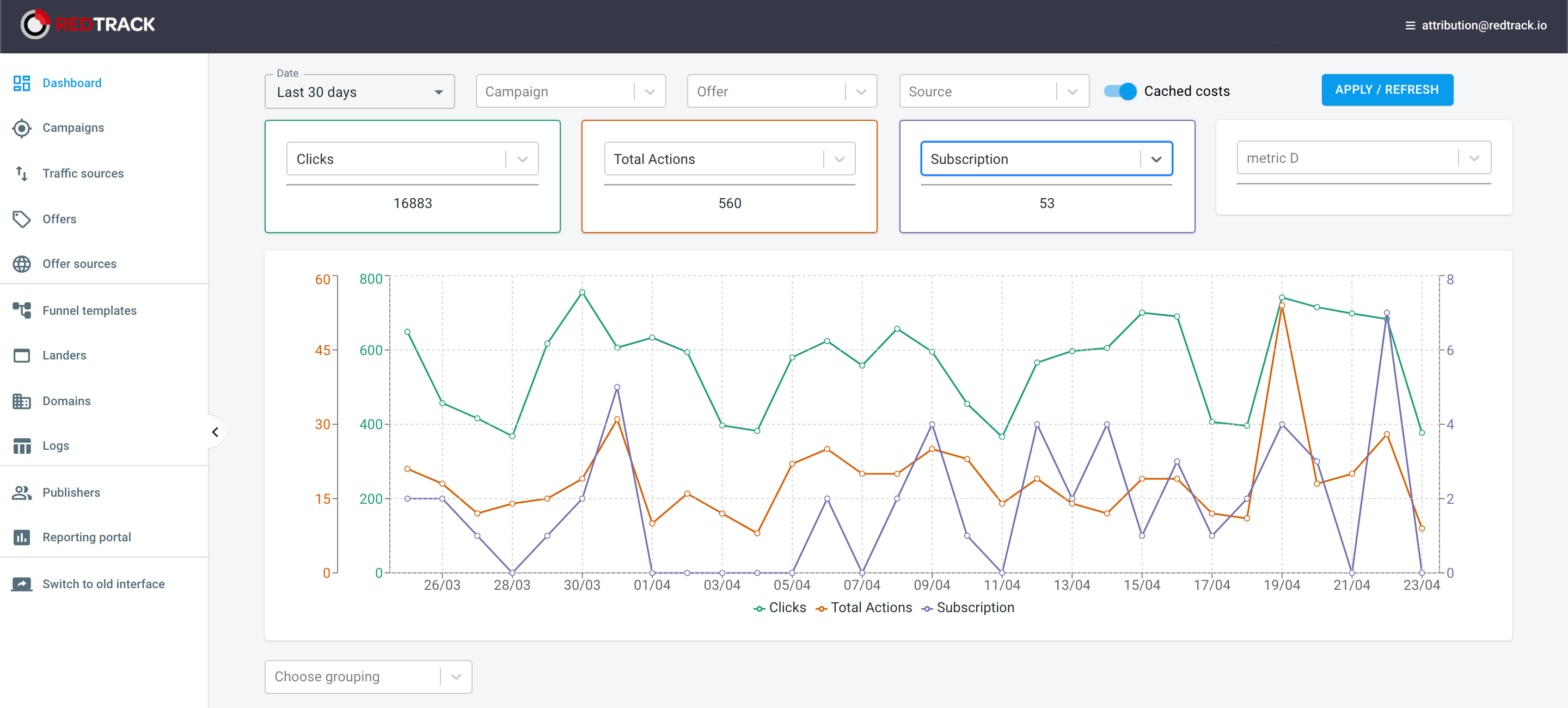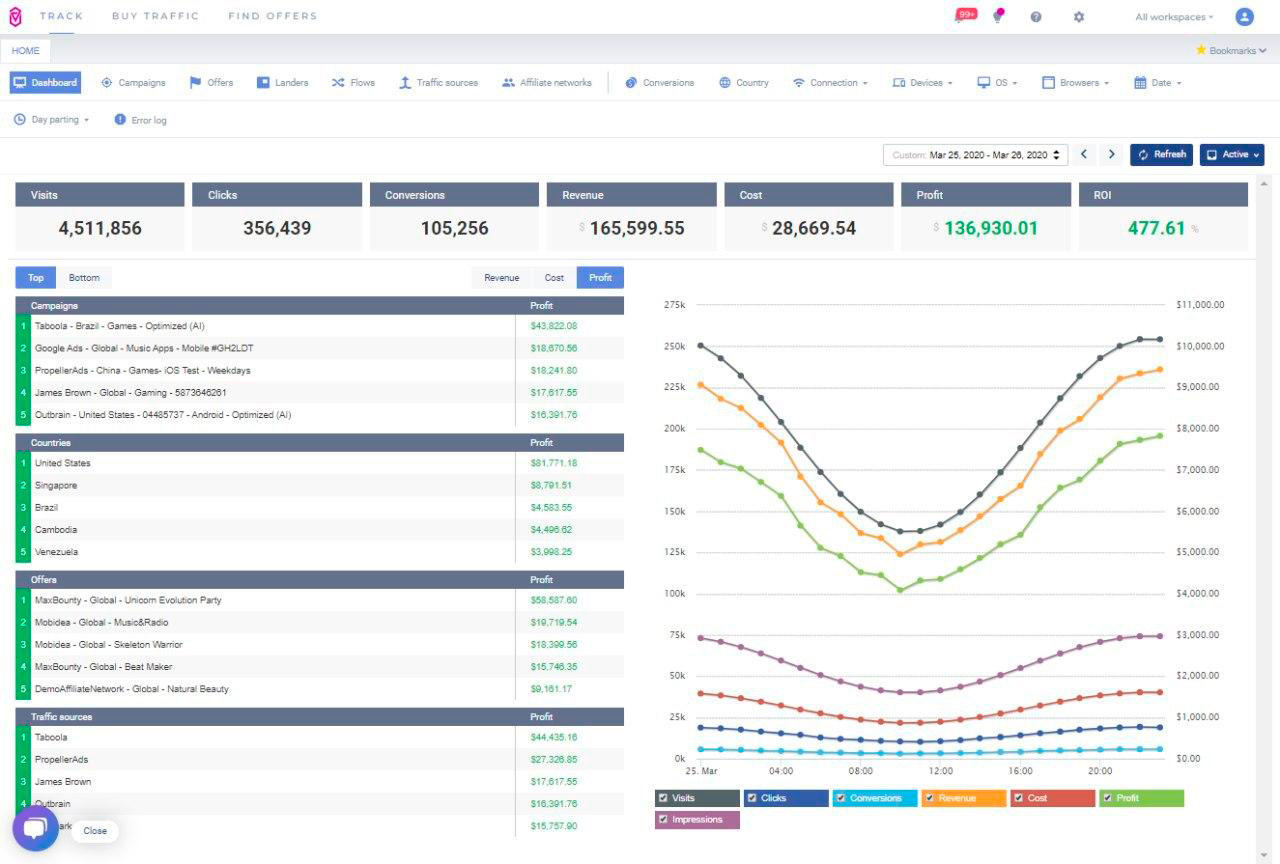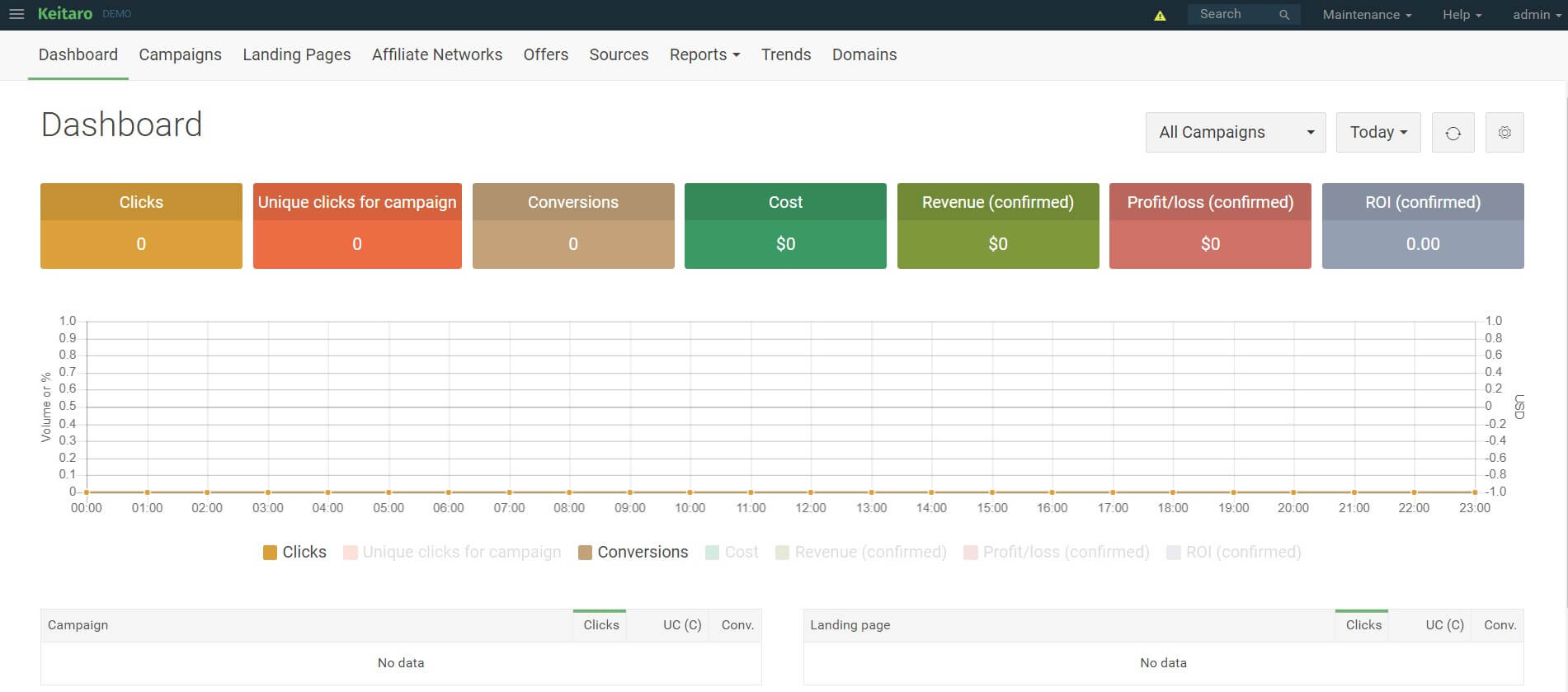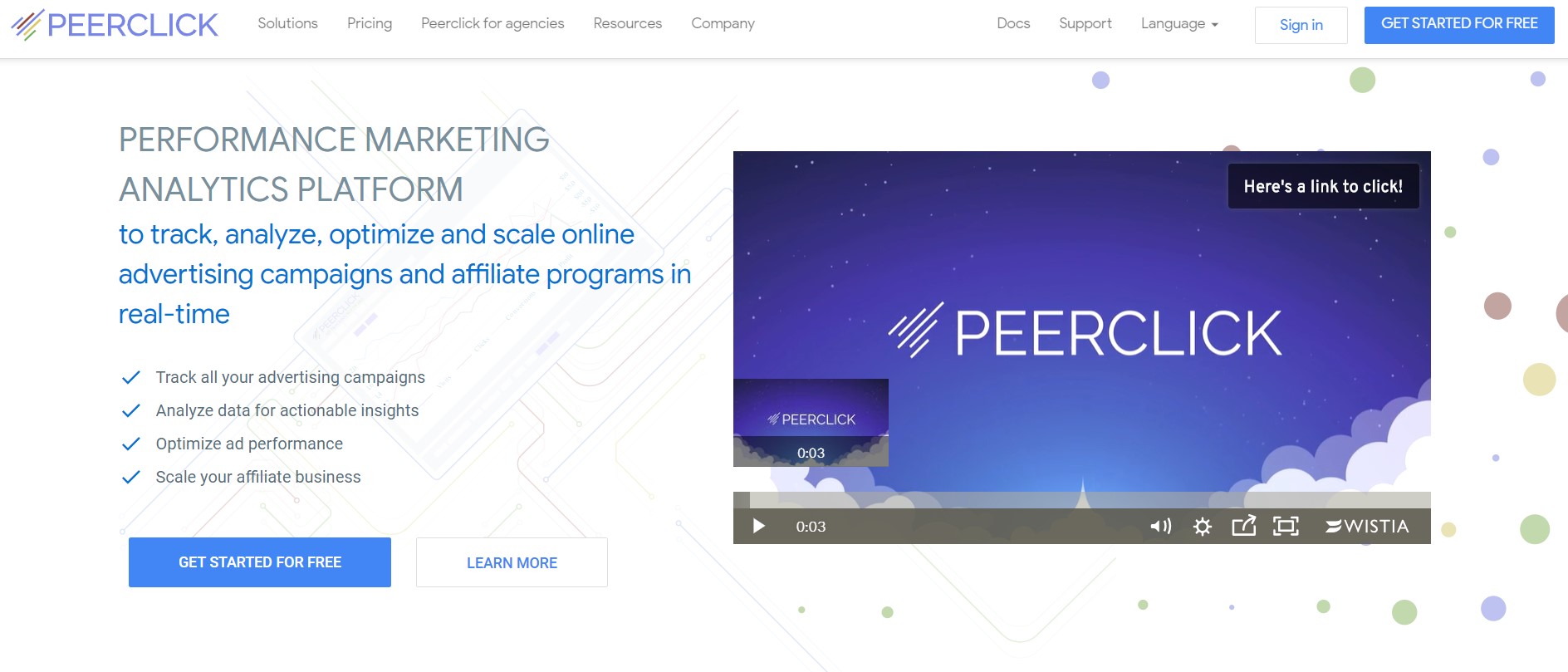Why Should You Have a Traffic Arbitrage Tracker?
With the help of a CPA tracker, you’ll be able to measure the efficiency of your advertising campaigns, run A/B tests, sort traffic and switch between advertisers, landing pages and offers without changing the link in the advertising campaign.
What Is the Difference Between a Tracker and Tds?
Sometimes, you will stumble upon the acronym TDS, which stands for Traffic Distribution System. It is a system for traffic distribution and analysis. It is only a part of any tracker’s functionality, with many more options available.
What Is the Purpose of a Tracker?
- Analysis of link efficiency
We have already highlighted the importance of finding a working link in one of our previous articles. You can do it by using a tracker to analyze the data. Also, you’ll be able to compare the performance of different resources, creative content and even the conversion of the same offer in different affiliate networks. It is highly convenient to have all the analytics in a single interface. This way, you won’t need to switch between multiple browser tabs and put all the data together into one table for further comparison. - Reap the benefits of traffic
With the help of a tracker, you’ll be able to sort traffic and direct it to different offers to get the best conversion. For example, you are launching an advertising campaign for an application for iOS or Android, and then you’re driving the traffic to the app’s page in App Store or Google Play. You can also sort traffic according to its geolocation, language, operators, source and more. Some advertisers pay more for the traffic from a particular country. - Redirect the traffic with a couple of clicks
You won’t need to stop your advertising campaign and change the link to redirect the traffic to another offer or switch to another affiliate network. You will be able to do it within a couple of minutes in your tracker’s interface. - Automatically switch to another network if the lead limit has been reached
A tracker allows you to choose a limit for every lead for your offer within the network. When the limit is reached, the tracker will redirect the traffic to the same offer in another network. - Run A/B split test
A tracker helps to divide the traffic among multiple landing pages, offers and direct addresses.
7 Most Popular Trackers for Traffic Arbitrage
We picked up the trackers with the best reviews, so you can take a look at their advantages and disadvantages.
There are two types of trackers:
- Self-hosted trackers that require their installation on a server or hosting service.
- Cloud trackers are cloud platforms that work in online mode.
Redtrack

- Type: Cloud-based
- Price: starting $49/mo; a free 14-day trial period available with no CC required.
RedTrack is one of the leaders of the ad tracking market. They offer a competitive solution that covers a wide functionality like ad tracking, automation of your media buying, real-time reporting, and multi-touch attribution. RedTrack also gives you a toolkit to start your own referral/affiliate program and a white-label reporting portal to build transparent communication with your ad partners.
Advantages:
- the universal solution that helps you cut the costs on several tools
- one-click integration with 180+ platforms (Facebook, Google, TikTok, Reddit, Taboola, Travelpayouts, Shopify, Clickbank, etc.)
- ability to share conversion data with partners
- auto-optimization based on your rules
- attribution report to measure the influence of different channels on your final CR and ROI
Disadvantages:
- with all the features they offer a tool may seem a bit complicated
- advanced features are available on more expensive subscription packages
Voluum

- Type: Cloud.
- Price: $69 – $999 per month with significant discounts on annual plans
Voluum is a cloud-based performance tracking software for affiliate marketers, bloggers, and marketing agencies. It tracks, optimizes, and scales all your ad campaigns in one place.
Voluum is an industry veteran. Multiple data centers across five continents and 100% uptime since 2015 ensures no click loss when tracking affiliate campaigns.
Advantages:
- High performance
- Full API integrations with popular traffic sources
- Lots of useful features, such as AI Optimization, Anti-Fraud Kit, Alerts
Disadvantages:
- Plentiful options make it a harder tracker to master
Keitaro

- Type: Self-hosted.
- Price: $25 – $70 a month. There is a free version with several limitations and a demo-version allowing you to take a look at the interface of the program.
Keitaro is a functional tracker with flexible settings, and it is easily integrated with any website, platform or service. Keitaro allows you to classify traffic according to its country of origin, language, browser, provider, key words and more.
Advantages:
- Fine tuning of access settings: You can provide access only to campaigns or reports, at your wish.
- Multilevel classification of reports allows you to switch on the necessary metrics.
- A quick connect to over 100 templates of affiliate networks.
- Reasonable price.
Disadvantages:
- You’ll have to install a tracker on your server or hosting service. It isn’t hard, but you’ll need some technical knowledge. For example, it is important to choose the right server so that it could provide you with a good number of clicks, otherwise, the data will be collected with a delay.
Adsbridge

- Type: Cloud.
- Price: $29 – $799 per month with a free trial of 14 days, and the version available has several limitations.
With AdsBridge, you can start earning on traffic arbitrage with the help of the Smartlink system, which creates a single link accepting all the traffic. The system analyzes every visitor who has clicked on the link and redirects them to a suitable offer in real-time. You can make use of the SmartLink yourself to automate the process of traffic monetization or hire a team of web traffic arbitrage experts and provide each one of them with a link to direct traffic to.
You can also spread the word about AdsBridge and receive 30% lifetime monthly commission.
Advantages:
- A wide range of opportunities.
- You can run your own business with a team of experts.
- AdsBridge has a constructor for landing pages in contrast to other trackers.
Disadvantages:
- High cost.
Binom
- Type: Self-hosted.
- Price: $69 per month, a free trial of 14 days, you can choose between a full version and a demo-version, which allows you to take a look at the platform’s interface and check the tracker’s functionality.
Binom is a popular tracker, used by many people, from seasoned experts to newbies, because of its simple interface, numerous instructions for every occasion and customer support service. Binom developers understand that the ROI and conversion rates depend a lot on the click processing speed, and that a fast report generation contributes to the performance of traffic arbitrage, so the platform has a high performance rate.
If you use Binom, try out the smart rotation. If a user leaves your landing page without any action, the system will direct them to another landing page next time.
Advantages:
- High-performance speed even when processing “heavy” reports with a large number of parameters.
- Support managers respond very fast, and your question will be answered in detail.
- An intuitive interface.
Disadvantages:
- You’ll need to install a tracker on your hosting or server.
Heymallory
- Type: Cloud and self-hosted versions.
- Price: $15-$75 per month, self-hosted version is free of charge with a limit of 10,000 clicks per day. However, you’ll need to pay for customer support service. A free trial of 3 days is available for online version.
It is one of the oldest trackers, and the key advantage is that you can use it for free. So, start with the HeyMallory tracker if you lack resources at the moment and don’t have much experience in traffic arbitrage.
Advantages:
- An intuitive interface.
- A free-of-charge version with a few limitations.
Disadvantages:
- There’ve been complaints related to the unstable redirect speed.
- Sometimes, the program shows incorrect information about the user’s country or a browser they use.
Peerclick

- Type: Cloud.
- Lifetime Free Plan with limitation of 100.000 events per month
- Prices: $0 – $649 per month.
- Interface and documentation language: English
PeerClick provides affiliates with a wide range of campaign optimization features and a large number of parameters for analyzing traffic.
The tracker can easily work with huge amounts of traffic, and maintain a high speed of data processing. 150+ integrated affiliate networks and traffic sources and the availability of guides for their configuration will greatly simplify the start of work with the tool.
It is also possible to build your own affiliate networks on White Label.
Use promo code ‘’TRAVELPAYOUTS‘’ and get $50 off any plan purchase!
Advantages:
- As this is a cloud solution, you can start working with it in a heartbeat.
- Very fast and responsive support in chats.
- High processing speed.
- Integrations with Appsflyer and Kochava, which allows to track installs.
- Intelligent DNS Routing – directing traffic to the most optimal route between servers, which increases redirect speed and reduces traffic losses
Disadvantages:
- There is only basic functionality available on Free Plan.
- Limitations on the volume of processed clicks.
What CPA Tracker to Choose
In general, all trackers are aimed at solving the same tasks. The differences are in the details you’ll see in practice. Every tracker has a demo version and a free-trial period, but in order to test it properly, you’ll need a lot of time. First, it’s important to narrow down a range of choices.
- Choose between a cloud service and a self-hosted tracker.
- Decide what reports you’ll need and what click limit is acceptable in your case.
- Determine what amount of money you’ll be able to spend on the tracker.
- Compare different tracker tariffs and find services containing all the necessary functions of your price range.
- Once you have narrowed down the options, try out trackers of your choice to check their convenience in terms of interface simplicity, advertising campaign creation and reporting.



